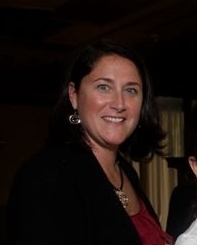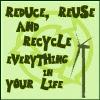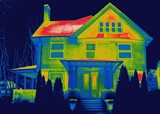by Jim Babcock
 100 Illinois Communities want to know how they can save too
100 Illinois Communities want to know how they can save too
For the last month, phone calls have been streaming in from all over Illinois to the office of Oak Park’s Sustainability Manager, K.C. Poulos. These calls are inquiries about Oak Park’s successful Community Choice Aggregation (CCA) program. One hundred Illinois communities such as Urbana, Arlington Heights, Belleville, and Elmhurst want to find out how they too can save close to 25% on their electric power rates.
That’s the savings that Oak Park residential and small business accounts can see starting the first of the year, after the Village Board approved a new 2-year contract on October 17th with Integrys Energy Systems. In addition to the much lower rate, the new agreement for electric power is remarkable in that the source is from 100% renewable wind power—92-94% of which will be from credits from wind farms within Illinois. This development, acquiring totally clean electric energy from local sources, has created “quite a splash” according to Poulos.
CCA programs are not new—there are 19 other cities in Illinois that have already gone to the open market to find more economical electric energy sources. What is novel about Oak Park’s bid process is that it requested an option for renewable energy sources in the power mix.
Growing numbers recognize the need to move quickly beyond carbon-based energy
“To some, this may be just about saving money on one’s electric bill, which is a very good thing,” said Village Manager Tom Barwin. “But to those increasingly growing numbers of individuals who recognize the need to move as quickly as possible beyond carbon-based energy generation systems toward clean, renewable energy sources, this is a significant, far-reaching step.”
Indeed, Oak Park is just part of a rising worldwide demand for renewable energy of all kinds. According to Bloomberg New Energy Finance, 2010 was the first year that global investments in power plants from renewable sources (wind, sun, waves and biomass) exceeded that for new fossil-fuel sources (natural gas, coal and oil).
Oak Park’s efforts to reduce its dependence on polluting energy sources don’t end with the CCA program.
Next Steps for Oak Park
It is anticipated that the citizens advisory committee which helped in the planning for the CCA will transition into a more permanent Renewable Energy Advisory Commission. This body will monitor implementation of the CCA program and research additional renewable energy strategies.
One of their first activities will be to visit Milwaukee, where the “Milwaukee Shines” program brings affordable solar electric and solar hot water systems to homeowners and small businesses. The benefit of this program is that ratepayers then not only save on the cost of the energy, but also on the delivery of the power, by being “off the grid”.
According to K.C. Poulos, the Village is also continuing to work with stakeholders to see how an Energy Efficiency Fund can be implemented. Educating the public about the importance of energy efficiency, and developing creative financial tools to make efficiency investments affordable for individuals and small businesses remains an important goal.
Moving Toward Sustainability
The current cost advantage of open-market energy rates compared to ComEd rates may be somewhat temporary—hence the urgency of up to 130 municipalities around the state to put CCA referenda in place for voters next spring.
Crain’s Chicago Business says, “. . .there’s a relatively short time frame in which communities can generate the 20%-plus savings they’re getting now because ComEd’s power prices are expected to more closely mirror the overall market within two years, as high-priced power-supply contracts expire.”
So dirty coal power may again become “cheap” until a price for global warming pollution that reflects the very real harm to humans is instituted.
“Hello, California? This is Oak Park calling.”
A strategy that is not so vulnerable to the volatility of the energy open market is that of energy efficiency—like the decades-old, comprehensive program in California that specifies efficient use of energy in manufacturing, building standards, appliances, agriculture, and lighting. The result? According to the 2010 U.S. Census, the per capita electric energy usage in Illinois is 11,253 kWh, while California’s is a meager 6,721 kWh!
“Hello, California? This is Oak Park calling.”
 Oak Park Ranks First in Percent of Green Electricity Used
The U.S. Environmental Protection Agency (EPA) has designated Oak Park a Green Power Community for the decision to choose renewable energy sources for its community electricity aggregation program. Green Power Communities are cities, towns and villages where the local government, businesses and residents collectively buy green power in amounts that meet or exceed EPA’s purchase requirements as part of the Green Power Partnership. Oak Park is the newest of 32 Green Power Communities nationwide and currently ranks first in terms of highest green power percentage of total electricity use and fifth in amount of green power used. Green power is electricity generated from environmentally preferable renewable resources, such as wind, solar, geothermal, biogas, biomass and low-impact hydro.
Oak Park Ranks First in Percent of Green Electricity Used
The U.S. Environmental Protection Agency (EPA) has designated Oak Park a Green Power Community for the decision to choose renewable energy sources for its community electricity aggregation program. Green Power Communities are cities, towns and villages where the local government, businesses and residents collectively buy green power in amounts that meet or exceed EPA’s purchase requirements as part of the Green Power Partnership. Oak Park is the newest of 32 Green Power Communities nationwide and currently ranks first in terms of highest green power percentage of total electricity use and fifth in amount of green power used. Green power is electricity generated from environmentally preferable renewable resources, such as wind, solar, geothermal, biogas, biomass and low-impact hydro. 








![sga_web_image_planitgreen[1]](http://static1.squarespace.com/static/5bae9e8593a63215bb435ef6/5bca6ca688199e9da162d042/5bca6ca988199e9da162d302/1539992745551/sga_web_image_planitgreen1.jpg?format=original)


